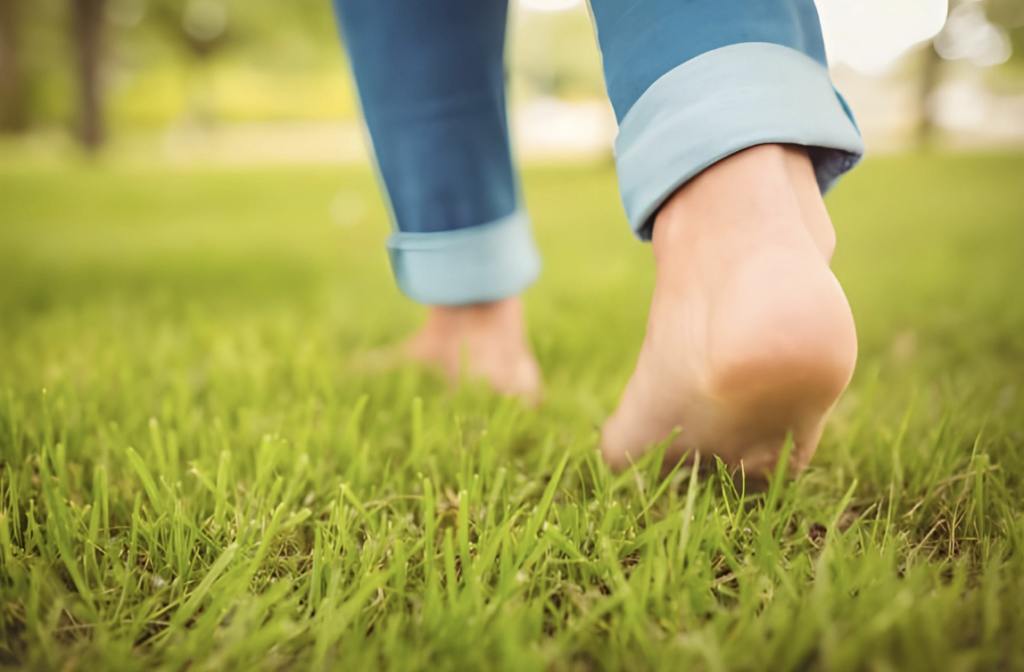Health
Is Walking Barefoot the Key to a Healthier You?
Walking barefoot is a centuries-old practice. It’s a simple deed that ties us with the earth’s natural elements. But did you realize that walking barefoot provides more than just a natural experience? Studies indicate that it may have considerable health benefits. This article discusses the potential benefits of walking barefoot and how it can improve your health and general well-being.
The History of Walking Barefoot
Walking barefoot has long been a cultural norm. People in ancient civilizations lacked access to modern footwear, therefore they had to navigate varied terrains barefoot. Walking barefoot was considered a natural way of life, with no negative overtones.
The Science Behind Walking Barefoot
When we walk barefoot, our feet have direct contact with the ground, which provides a sensory experience that can excite nerve endings and improve balance and proprioception. This direct contact with the earth’s surface stimulates the hundreds of nerve endings in our feet, resulting in a feedback loop between our brain and our feet. This technique helps us improve our spatial awareness and coordination.

Benefits of Walking Barefoot
Walking without shoes strengthens the muscles, tendons, and ligaments in our feet and ankles. This can improve foot mechanics and lessen the likelihood of common foot disorders including plantar fasciitis and flat feet. Strong foot muscles also help to improve general posture and alignment. Walking barefoot can also help strengthen arches and make toes more flexible, resulting in better overall foot health.
Strengthening Foot Muscles
Walking barefoot activates the muscles in our feet and ankles in a manner that shoes do not. To maintain balance, we grip and flex our toes, which serves to develop the foot’s intrinsic muscles. These muscles are crucial for keeping the foot arches in place and providing stability during movement. Walking barefoot on a regular basis can improve muscular strength and endurance, resulting in better overall foot function.
Improving Balance and Posture
Walking barefoot not only strengthens our foot muscles, but it also improves our balance and posture. Walking without shoes allows our feet to better sense the ground under us, which improves proprioception. Proprioception is our body’s knowledge of its position in space and the ability to adjust accordingly. Barefoot walking improves proprioception, which improves overall balance and posture and lowers the chance of falls.

The Connection Between Barefoot Walking and Reduced Foot Pain
Walking barefoot might also assist to relieve foot pain and discomfort. Many common foot conditions, including plantar fasciitis and flat feet, can be aggravated by poor foot mechanics and weak foot muscles. Walking barefoot helps to strengthen the muscles that support our feet’s arches, which improves overall foot mechanics and reduces the chance of pain and injury. Walking barefoot also provides sensory stimulation, which can help relieve foot pain by improving blood flow and fostering relaxation.
Tips for Safe and Effective Barefoot Walking
While barefoot walking has various advantages, it is critical to approach it carefully and gradually. Here are some recommendations to help you incorporate barefoot walking into your daily routine:
- Start slowly: Begin by walking barefoot for short periods on safe and clean surfaces, such as grass or sand. Gradually increase the duration and intensity of your barefoot walks over time.
- Pay attention to your surroundings: Watch out for sharp objects or uneven surfaces that could potentially cause injury. Scan the ground ahead of you to avoid any potential hazards.
- Listen to your body: If you experience any discomfort or pain while walking barefoot, take a break and allow your feet to rest. It’s important to listen to your body and not push yourself beyond your limits.
- Consider minimalist footwear: If going completely barefoot is not feasible or comfortable for you, consider using minimalist footwear, such as thin-soled shoes or sandals. These types of footwear provide some protection while still allowing for a more natural walking experience.
Common Misconceptions
Despite the potential health benefits, there are several myths about walking barefoot. One frequent misunderstanding is that being barefoot makes your feet stronger and less sensitive. However, studies have shown that walking barefoot increases foot sensitivity and strengthens the foot muscles.
Another misunderstanding is that walking barefoot increases the likelihood of injury. While it is vital to exercise caution and be aware of potential hazards, walking barefoot can actually improve foot mechanics and lessen the incidence of some foot problems when done correctly.

Incorporating Barefoot Walking into Your Daily Routine
While going barefoot may not be practicable or appropriate in every setting, adding more barefoot walking into our daily lives has the potential to improve our general health and wellbeing. Here are several methods to incorporate it into your regimen.
- Take off your shoes at home: Spend more time walking barefoot indoors, allowing your feet to connect with different surfaces in your home.
- Explore barefoot-friendly activities: Engage in activities such as yoga, Pilates, or tai chi that can be done barefoot, providing an opportunity to strengthen your feet while enjoying the benefits of these practices.
- Find barefoot-friendly environments: Seek out places where walking barefoot is encouraged or allowed, such as parks or beaches with soft sand. These environments provide a safe and comfortable space to go shoeless.
Conclusion
In conclusion, walking barefoot has a number of possible health benefits. Going shoeless can benefit our general health in a variety of ways, including strengthening foot muscles, increasing balance, and lowering foot pain. While going entirely barefoot is not always practicable or appropriate, including more barefoot walking into our daily lives can help us bond with nature and foster a sense of calm and awareness. So take off your shoes and feel the dirt beneath your feet; your body and mind will appreciate it.
Trusted Health, Wellness, and Medical advice for your well-being


